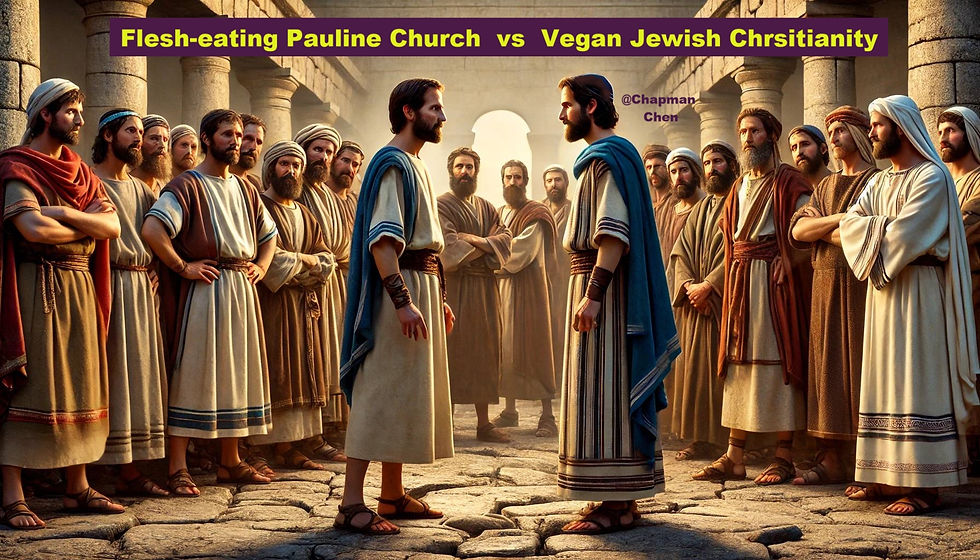Two Opposing Camps of Christianity: One Vegan, One Flesh-Eating. By Brad Dixon. Paraphrased by Dr. Chapman Chen
- Chapman Chen

- Jan 8
- 3 min read

After Jesus’ crucifixion in 33 AD, two opposing camps of Christianity emerged. The first was the Jewish sect led by Jesus’s brother James, later known as James the Just. This branch suffered a severe blow when James was killed in 62 AD, followed by the destruction of Jerusalem and the Jewish temple by Roman legions in 70 AD. It is recorded that many Jewish Christians fled to Pella, located in present-day Jordan. This group became known as the Ebionites, a name derived from the Hebrew word for "poor," reflecting their belief in Jesus's teaching that the poor would inherit the kingdom of God (Matthew 5:3). This group should not be confused with pre-Jesus sects like the Zealots, Sadducees, Essenes, Samaritans, Pharisees, and Nazarenes.
According to Epiphanius, a 4th-century church historian, the Ebionites were vegetarians and held a strong belief that Jesus rejected animal sacrifice and meat consumption. In the Gospel of the Ebionites, Jesus confronts a high priest, stating, "I am come to end the sacrifices and feasts of blood; and if ye cease not offering and eating of flesh and blood, the wrath of God shall not cease from you." The apostle Peter, who became a vegetarian (as mentioned in the Clementine Homilies), also instructed his followers to abstain from eating meat. Hegesippus, a 2nd-century orthodox Christian, described James the Just as someone who "drank neither wine, ate no flesh" and said, "Who and whatever James was, so was Jesus." James was particularly concerned that the idea of "justification by faith alone" could be misused to justify harm to others, including all of God's creatures and creation. He believed that people should be judged by their deeds, guided by the faith that motivates them.
The second camp was led by the Apostle Paul, who was not one of the original twelve apostles. Also known as Saul of Tarsus, Paul was a former Christian bounty hunter who converted to a follower of Jesus after an encounter with the resurrected Christ on the road to Damascus. Paul's movement, often called the Pauline group, thrived unaffected by the destruction of Jerusalem, surpassing the fragmented Jewish-Christian movements. Considered one of the most influential figures of the Apostolic age, Paul established several churches between the mid-30s and 50s AD. Originally a Pharisee, Paul studied under one of the most prominent teachers of this sect. Of the 27 books in the New Testament, up to 13 (seven undisputed and six debated) are attributed to Paul, depending on the source.
The Ebionites were later deemed heretical by mainstream Christians and eventually absorbed into Islam, where their vegetarian values influenced the Sufis. Rabia al-Adawiyah, a revered female Sufi saint, was a vegetarian. While vegetarianism was common among early Christians during Paul’s time, Paul sought to distance himself from many practices of the Jewish sects. There is evidence of tension and a possible power struggle between Paul and James. Paul even stated, "Christians who eat only vegetables have weak faith" (Romans 14:1-2). And he reassured people that faith alone guarantees salvation (2 Peter 3:14-16). In contrast, James’s perspective of integrating faith with compassionate deeds presents a more comprehensive approach, emphasizing that authentic belief must align with compassionate actions.
Source:
Dixon, Brad (2018). "Was Jesus a Vegetarian?" Everfit, Apr. 11. https://www.everfit.co.nz/articles/jesus-kick-arse-animal-rights-activist
Brad Dixon is a New Zealand sports physio, coach, and wellness evangelist based at EVERFIT Physio & Coaching. His book ‘Holistic Human’ is available at: https://everfit.co.nz/Store/Category/Book . Connect with Brad at www.everfit.co.nz, Facebook, Strava, Instagram (@everfitcoach), and YOU TUBE https://youtube.com/c/EverFITcoach





Comments